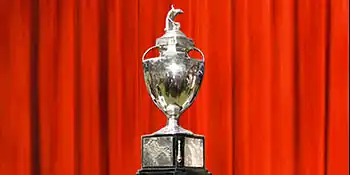 The Ranji Trophy | |
| Administrator(s) | BCCI |
|---|---|
| Cricket format | First-class |
| Tournament format(s) | Knockout |
| Champions | Maharashtra (2nd title) |
| Participants | 19 |
| Matches | 18 |
| Most runs | Ranga Sohoni (Maharashtra) (655)[1] |
| Most wickets | Chandu Sarwate (Maharashtra) (24)[2] |
The 1940–41 Ranji Trophy was the seventh season of the Ranji Trophy. Nineteen teams took part in four zones in a knockout format. Maharashtra retained the title defeating Madras in the final. Maharashtra would enter and lose three more finals but as of 2014, 1940-41 remains their last Ranji title.
With cricket affected by the Second World War, Ranji Trophy was only regular domestic tournament that continued in the senior cricket nations.
Highlights
- Maharashtra won their first four matches on first innings lead and won only the final outright.
- Maharashtra made a Ranji record score of 798 against Northern India in the semifinal, batting for most of the first three days. Originally scheduled as a three-day match, the semifinal was extended to a fourth day for the teams to complete their first innings.
- D. B. Deodhar was 48 years and 306 days old when he scored 246 against Bombay. As of 2014, he is the sixth oldest player to score a double century in first class cricket, and the second oldest Indian after C. K. Nayudu who did it at the age of 50 years and 142 days in 1945–46.[3]
- The Bombay – Maharashtra match was scheduled for three days but went to five before the first innings were completed. Maharashtra made 675 and Bombay 650.
Zonal matches
West zone
| Round 1 | Round 2 | Round 3 | ||||||||
| 8 November 1940 – Jamnagar | ||||||||||
| Nawanagar | 117 & 140 | |||||||||
| 1 December 1940 – Rajkot | ||||||||||
| Western India | 57 & 203/8 | |||||||||
| Western India | 250 & 159/4 | |||||||||
| Sind | 239 & 168/7d | |||||||||
| 8 February 1941 – Rajkot | ||||||||||
| Western India | 459 | |||||||||
| Maharashtra | 460/3 | |||||||||
| Gujarat | Walkover | |||||||||
| 13 January 1941 – Ahmedabad | ||||||||||
| Baroda | ||||||||||
| Gujarat | 335 | |||||||||
| 15 November 1940 – Poona | ||||||||||
| Maharashtra | 518 | |||||||||
| Maharashtra | 675 | |||||||||
| Bombay | 650 | |||||||||
North zone
| Round 1 | Round 2 | |||||
| 15 November 1940 – Peshawar | ||||||
| North West Frontier Province | 97 & 88 | |||||
| Northern India | 134 & 280 | |||||
| Northern India | Walkover | |||||
| 15 November 1940 – Patiala | ||||||
| Southern Punjab | ||||||
| Southern Punjab | 275 | |||||
| Delhi | 111 & 106 | |||||
East zone
| Round 1 | Round 2 | |||||
| 30 November 1940 – Jamshedpur | ||||||
| Bihar | 217 & 58/6 | |||||
| 7 December 1940 – Calcutta | ||||||
| Bengal | 257 & 262/3d | |||||
| Bengal | 147 & 126 | |||||
| United Provinces | 191 & 226 | |||||
South zone
| Round 1 | Round 2 | |||||
| 14 December 1940 – Madras | ||||||
| Madras | 174/7 | |||||
| 30 December 1940 – Madras | ||||||
| Mysore | 171 | |||||
| Madras | 227 & 257/9d | |||||
| Hyderabad | 98 & 132 | |||||
Inter-zonal knockout stage
| Semi-finals | Final | |||||
| 6 February 1941 – Madras | ||||||
| Madras | 271 & 158 | |||||
| 7–9 March 1941 – Madras | ||||||
| United Provinces | 255 & 149 | |||||
| Madras | 145 & 347 | |||||
| 22 February 1941 – Poona | ||||||
| Maharashtra | 284 & 210/4 | |||||
| Maharashtra | 798 | |||||
| Northern India | 442 | |||||
Final
7–10 March 1941 Scorecard |
Madras (H) |
v |
|
145 (58.4 overs) NJ Venkatesan 31 Krishnarao Jadhav 4/23 (9.4 overs) |
||
- Madras won the toss and elected to bat.
- Indian Express,[4] p.8, and CricketArchive, list M. G. Vijayasarathi as the umpire instead of Naik
References
- ↑ "Ranji Trophy, 1940/41 / Records / Most runs". Retrieved 23 August 2014.
- ↑ "Ranji Trophy, 1940/41 / Records / Most wickets". Retrieved 23 August 2014.
- ↑ Oldest batsmen to score double hundreds, acscricket.com
- ↑ Indian Express, p.8
This article is issued from Wikipedia. The text is licensed under Creative Commons - Attribution - Sharealike. Additional terms may apply for the media files.